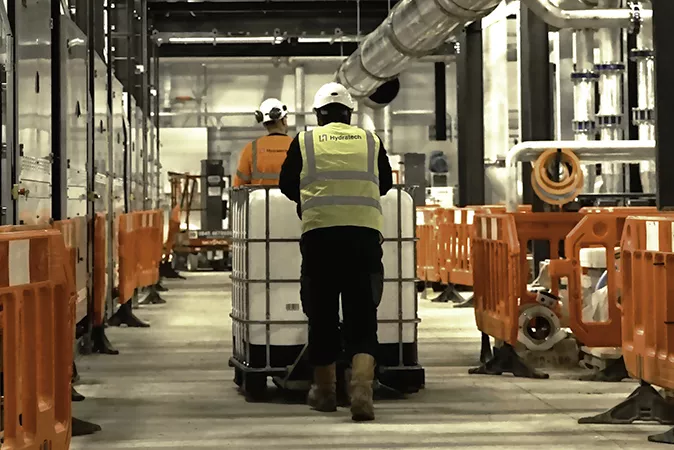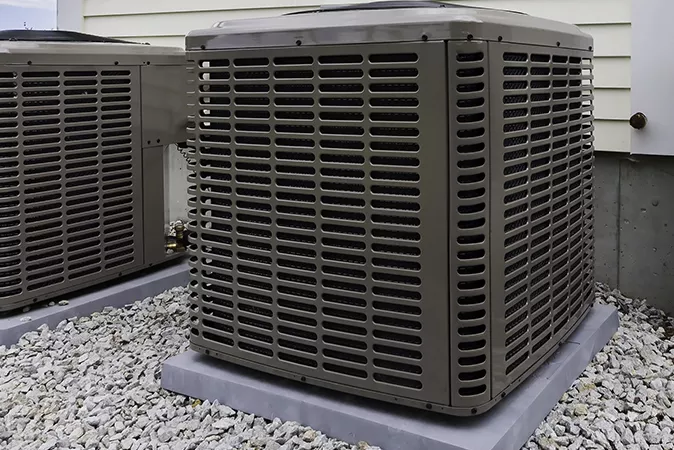Chiller Glycol Products
Selecting an appropriate formulation, mixing ratio and compatible inhibitor package is essential for the smooth running of a chiller system.
More about Chiller Glycol ProductsAutomotive antifreezes are not formulated for complex mixed metal chillers, or any other low temperature industrial applications. Many automotive antifreezes are not glycol based and contain silicate-based inhibitors (necessary to protect automotive engines), that can cause serious issues for chiller systems, including:
Regular drain and refill required
Automotive antifreezes generally have a short lifespan and require more frequent draining and refilling than inhibited glycols. Over the long-term, the cost of draining and refilling a system regularly with auto antifreeze will be far greater than the initial cost of inhibited glycol.
Uninhibited glycol/water solutions can be particularly corrosive and potentially more harmful to a chiller system than standard mains water. Inhibitors neutralise the natural tendency of water to corrode, scale and foul pipe-work systems and associated components.
To prevent internal corrosion, scaling and biological fouling all of Hydratech’s heat transfer fluids are formulated with multi-metal and multi-function inhibitors, which exceed ASTM D1384 standards.
Ethylene glycol is used in most industrial applications where low toxicity is not required. It offers the best heat transfer rates of all glycols and is often selected ahead of propylene glycol for this reason. The main drawback associated to ethylene glycol is its toxicity to humans and animals, making it unsuitable for the food and beverage industry and frequent user contact.
Hydratech’s IGE is an industrial grade secondary refrigerant antifreeze based on ethylene glycol for process cooling & AC systems - with proven corrosion, scale and biological inhibitors.
More information on Coolflow IGE here
Propylene glycol was developed to replace ethylene glycol for use in food and beverage processing systems or where there is a requirement for a non-toxic classification.
Characteristically, PG has a much lower capacity for efficient heat transfer, compared with ethylene glycol-based mixtures. It is also much more viscous at low temperatures and thus provides more of a challenge to pump.
Hydratech’s Coolflow NTP is a non-toxic antifreeze and secondary refrigerant based on propylene glycol for process cooling & AC systems - with proven corrosion, scale and biological inhibitors.
More information on Coolflow NTP here
Coolflow DTX was introduced in 2010 as a high performance non-toxic secondary refrigerant, suitable for replacing propylene glycol in food and cold storage cooling systems.
The game-changing fluid combines the thermal efficiency and low viscosity associated to ethylene glycol, with the non-toxic rating of propylene glycol. The list of DTX adopters is now extensive and includes Arla Foods, Mϋller Dairy, Waitrose, Airbus, Siemens and BrewDog.
It is important to check local environmental rules, as some areas have specific regulations regarding the disposal of working fluids. Your local authority will have all necessary guidelines.
If using regular tap water in a glycol/water solution, it is vitally important to apply the appropriate multi-metal and multi-function inhibitors. Mains water contains deposits and additives which can damage a chiller system and associated components.
An understanding of the local water’s characteristics is also important, as mains water hardness varies from region to region. City or town mains water can be particularly problematic as their water properties can fluctuate.
Using water from a good quality, filtered source will eliminate any uncertainties.
For optimum system protection, Hydratech recommend a filtered water and 25% v/v inhibited glycol mix.
Selecting the correct type and concentration of glycol is very important. The glycol type should already be known and recorded in the commissioning documents or maintenance logs for your systems.
Hydratech Services can assist with glycol determination analysis if it is not known – it is especially important to verify this for food or beverage process applications.
Too much glycol or too high a % will cause system inefficiencies through reduced heat transfer ability and pumping capacity. Not enough glycol or too low a % can lead to the expensive freeze-ups previously mentioned and can become susceptible to biological fouling.
Typically, external systems susceptible to freezing over winter months will need anti-freeze protection down to the lowest expected ambient temperature, with some margin advised for safety of +10%* (*Lowest temps ever recorded in UK -26.1°C - January 1982). To prevent internal corrosion, scaling and biological fouling year-round, it is recommended that the glycol is fully inhibited and monitored every 6 months. Hydratech recommend a minimum concentration for their inhibited glycols of 25% v/v – this would provide a freeze protection average of -10°C.
Managing chiller working fluids is important if process efficiency is to be optimised and operating costs minimised. It is not uncommon for the maintenance of cooling and heating systems to be overlooked.
Under such circumstances various issues can develop, including; advanced corrosion, biological fouling and sediment formation. All of which will have a direct and negative impact on heat transfer, pumping performance and energy costs.
Often, cooling systems that have been altered or upgraded are topped up with uninhibited water, resulting in a dilution of the antifreeze and inhibitors.
To verify long-term condition of the fluid and system, Hydratech recommend periodic analysis of the heat transfer fluid. Hydratech provide a range of Fluid Management Services™ to maximise thermal efficiency, minimise downtime and extend component life.
Regular analysis can extend the life of both fluid and system. Hydratech’s Fluid Monitoring Program (FMP) is a very straight forward, effective way to proactively monitor closed-loop system condition.

Selecting an appropriate formulation, mixing ratio and compatible inhibitor package is essential for the smooth running of a chiller system.
More about Chiller Glycol Products

If you need help or advice on selecting the most suitable product for your needs call one of our sales engineers today. With experience across many industry sectors we can help you find the most cost effective solution whilst meeting all your technical re
Call today on (860) 653-1691
Sorry, we need you to complete all the required fields before we can process your enquiry.